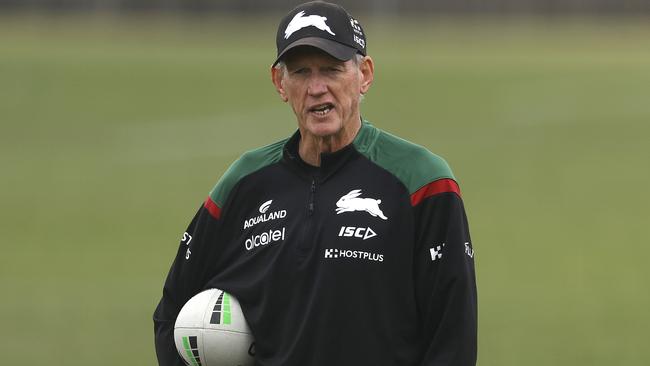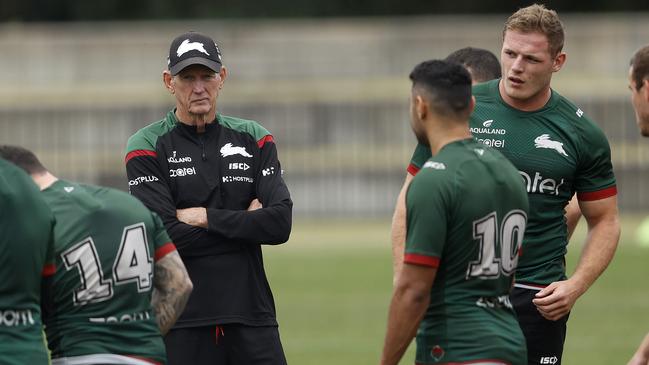A documentary is a terrific idea, but the NRL must get its bread-and-butter coverage right first, writes Paul Kent
A State of Origin documentary might be a terrific idea, but the NRL must get the basics right in its coverage first. And it failed to do that in the lead up to the grand final, making some embarrassing blunders.

Old grumpy bum, Wayne Bennett, might not be as grumpy as he seems.
Bennett has been portrayed as the ogre that brought down a possible State of Origin documentary that could have gone around the world.
Bennett’s refusal drew considerable criticism — which went off everywhere, including here — but that might have been an over-reaction.
The Queensland and NSW rugby leagues were concerned at the lack of information and that, with few details agreed upon, it could get chaotic once inside camp.
“Frightening,” said a director.
So concerning was the lack of detail in the proposal, the leagues were still unaware of the commercial agreement between the NRL, the production company and themselves even at this late stage.
The production company also wanted to send eight staff into camp, were told they could have two, and then planned for four as late as last week, when they were still advertising for employees willing to go into the bubble for four weeks.
Catch Fox League’s grand final reviews and replays on Kayo. New to Kayo? Get your 14-day free trial & start streaming instantly >

While Bennett was not a fan, he understood the value a well-made documentary could provide the game as the code slowly understands more and more how vital the media is to its financial survival.
For all the talk of conquering China during the Super League war and the continual ridiculing of rugby league’s World Cup as a genuine world competition, Origin is the one football contest here that could appeal around the world.
With the right storytelling, Origin’s unique format could sell like other documentaries on Netflix, or the ESPN 30 For 30 series, despite their unfamiliar subject.
Unfortunately it appears the NRL has a problem with its storytelling, led by the amateurish Channel 9 coverage.
Then it doubled down.
If there was a perfect storm over the weekend it came not just in the first 40 minutes of the NRL grand final but, like a foul wind, on Saturday night in the AFL.
Record ratings were the backstory to the AFL’s weekend triumph. With record speed the AFL pumped out the crowd had a 3.81 million national average, up 31 per cent on last year.
It was the AFL’s biggest average since the Western Bulldogs beat the Swans in 2016, which drew 4.1 million.
The AFL failed to disclose its hidden advantages.
The grand final was the first to be televised at night, in prime time. It also featured two big Victorian clubs and was played out of Melbourne for the first time, which is currently in lockdown.

It meant there was little else for Victorians to do on Saturday.
Against this, though, the NRL was positively anaemic.
Nine on Monday released its grand final viewership was up 13 per cent on last year, a fact eagerly tweeted by some of its disciples — only problem was, last year’s grand final was the lowest rating NRL grand final ever (2.7 million nationally).
Sunday’s 3.086 million national average was the fourth lowest ever, with three of the four worst-watched deciders coming in the past four years.
Worse, for all the Storm’s boasts about being well liked, and that the dislike was simply a “Sydney media agenda”, it does not translate to the medium that matters most.
Three of the television’s four worst-rated grand finals involved the Storm.
On Sunday afternoon NRL chief executive Andrew Abdo sat in the grandstand, waiting to do a radio interview and acknowledged the AFL’s performance the night before.
Abdo conceded the future of the game was emotional storytelling. Finding the story and telling it right.
MORE NRL
Kyle Flanagan signs with Bulldogs on monster three-year deal
Peter V’Landys backs Ryan Papenhuyzen as new ‘face of NRL’
Angry NRL powerless to punish Cameron Smith over referee remarks
With COVID-19 finally revealing that broadcast fees are well above what broadcasters make in return, signalling a reduction in future negotiations, Abdo conceded the game has to be smarter about the way it packages and sells itself. It was a lesson learned too late when Sunday’s ratings landed.
The NRL did a poor job of selling its grand final. Assistant coaches being trotted out two days before the biggest game of the year is an embarrassment.
The first State of Origin game will be played in eight days. It will be the first time the series is played after the NRL season. How fans will react is the question nobody at the NRL can answer.
A documentary is a terrific idea, but you have to get the bread-and-butter stuff right or it is pointless.
